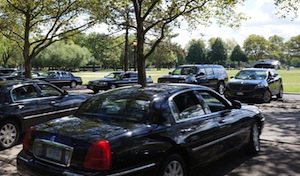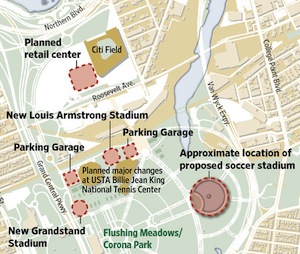A proposed Major League Soccer stadium in the middle of Queens’ largest park might have some cheerleaders in Albany, but lots of questions must be answered before the first game can be played. Perhaps the biggest issue is the stadium's transportation plan, the details of which -- those that have been made public, at least -- differ from what neighborhood advocates say MLS is telling them.

On Monday, a coalition of groups known as the Queens Coalition for Fairness, including Make the Road New York and Queens Community House, hosted a meeting in Corona. Donovan Finn, an urban planning professor at Stony Brook University, explained to the crowd of hundreds why the current MLS proposal is a bad proposition.
"I'm not necessarily against the idea of a soccer stadium in this part of Queens," Finn told Streetsblog. "But I do not think that the specific site MLS has chosen is the best choice."
"I don't think MLS has really thought the transportation issues through very much," said Finn.
MLS is proposing a new, 25,000-seat stadium at the current site of the Fountain of Industry, more than a half-mile from the Mets-Willets Point subway station. That's twice as far from the subway as the Billie Jean King National Tennis Center and eight times farther than Citi Field.
The league says it will build an undisclosed number of parking spaces beneath the adjacent Van Wyck Expressway, but that none of the currently-estimated 13 acres of park land taken for the stadium would be used for parking.
Instead, MLS says that most attendees arriving by car are expected to use existing parking at Citi Field, an arrangement that's likely subject to negotiation with Mets ownership. One potential problem Finn identified with this plan is double-booking Citi Field parking lots and overloading the 7 train, since soccer and baseball seasons occur at the same time of year.
Citi Field parking is up to three-quarters of a mile away from the proposed MLS site. The league says shuttle service to the subway or Citi Field parking lots is not currently part of its transportation plan, though community activists including Finn say MLS has told them otherwise.
The site, adjacent to the Van Wyck Expressway, is also near the Grand Central Parkway and the Long Island Expressway. Currently, that section of the park does not have direct highway access. MLS says the stadium will not require new access points or highway ramps. Finn is skeptical. "I am wholly unconvinced by MLS's argument that the stadium will require no new road construction," he said. Finn wonders, for instance, how trucks will make deliveries to the stadium using the park's perimeter access drives, which encircle but do not reach the stadium site.

In July, State Senator Toby Ann Stavisky told Newsday she was concerned that there wasn't "going to be enough parking" at the MLS site. Other elected officials have a wide variety of positions on the MLS proposal. Assemblyman Francisco Moya has been one of the project's biggest supporters, while Council Member Daniel Dromm was outspoken in his skepticism at the Queens Coalition for Fairness meeting this week. Council Member Julissa Ferreras, whose district includes the stadium site, has taken a more circumspect tone, arguing that while she does not oppose the MLS proposal, it must meet community needs.
Transportation isn’t the only unresolved issue.
State law requires that any park land lost to the stadium be made up with an equal amount of new park land, though nearby residents may end up effectively suffering a net loss of green space since there are few 13-acre sites available in adjacent areas.
In addition, MLS has offered to replace public soccer fields that currently sit on the stadium site. Local soccer leagues currently receive permits from the Parks Department to use existing fields. Future management of the fields after construction by MLS is an open question.
The stadium is one among several projects that have park users wary. Other speakers at Monday's Queens Coalition for Fairness meeting voiced concerns about proposals including the expansion of the National Tennis Center, a new retail development at Citi Field and a casino.





